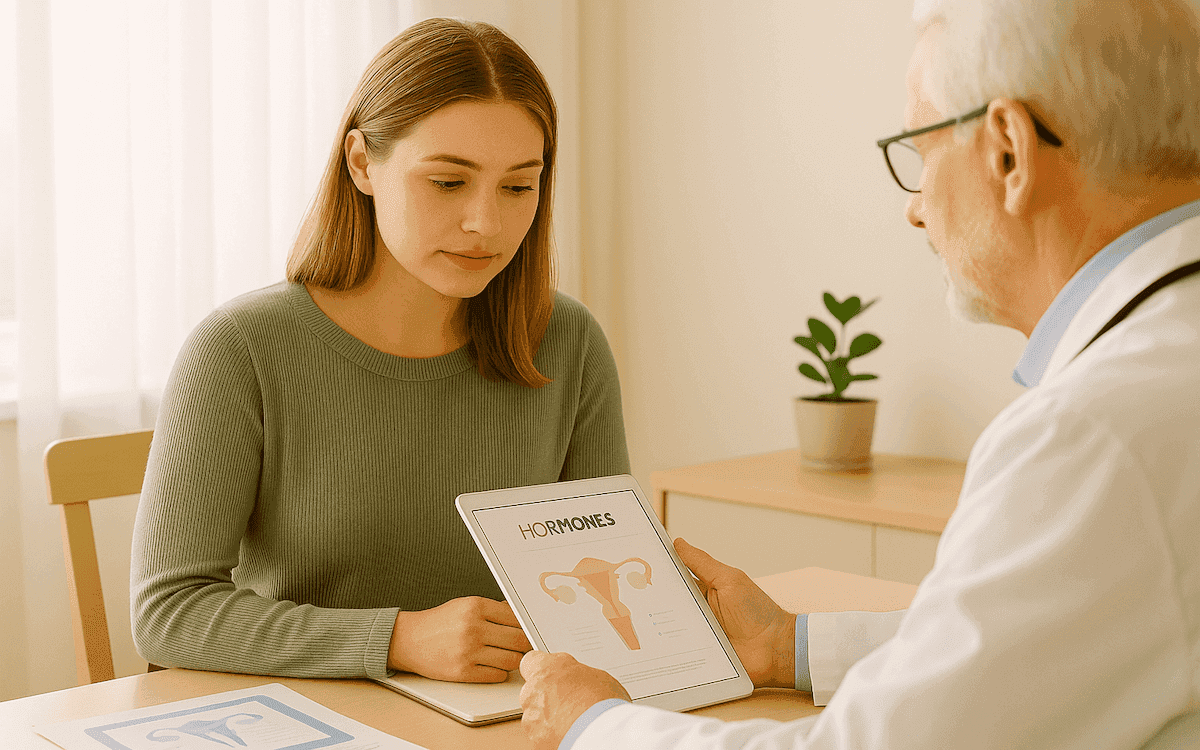

When Emma was 26, she thought her body was just “a bit off.” She didn’t know it yet, but her experience reflected what many women ask themselves at some point: how do I know if I have PCOS? Her periods had never been predictable, and her skin had started breaking out again, something she thought she left behind in her teenage years. She blamed stress, late nights, and too much coffee. It wasn’t until she and her partner began trying to conceive a year later and nothing happened that her doctor mentioned something she had barely heard of: Polycystic Ovary Syndrome, or PCOS.
For many women, Emma’s story feels familiar. PCOS often hides in plain sight, showing up as scattered symptoms that can easily be dismissed or explained away. Yet, beneath the surface, it’s a condition that affects up to 1 in 10 women of reproductive age, influencing not only menstrual health but also hormonal balance, metabolism, and fertility.
Quick Answer: You may have PCOS if you have irregular periods, acne, excess facial or body hair, unexplained weight gain, or difficulty getting pregnant. Doctors diagnose PCOS when at least two of the following are present: irregular or missing ovulation, high androgen levels, or polycystic ovaries on ultrasound. PCOS is manageable, and most women can conceive with treatment or lifestyle changes.
Many women searching “how do I know if I have PCOS” discover that the condition isn’t defined by cysts at all. Despite its name, PCOS is not defined by cysts. It is a hormonal disorder that affects how the ovaries function. Women with PCOS often have higher levels of androgens, or “male hormones,” which can disrupt ovulation, the monthly release of an egg.
Doctors typically use the Rotterdam criteria (2003) to diagnose PCOS. You must meet two out of three of the following:
Not every woman with PCOS has all three signs. Some may have regular periods but hormonal imbalances; others may have cyst-like follicles without symptoms.
If you want a deeper scientific look at the condition, Our article on Understanding PCOS: Insights into Polycystic Ovary Syndrome explains the biological mechanisms and how they affect reproductive health.
Unpredictable cycles shorter than 21 days or longer than 35 can signal inconsistent ovulation. Some women go months without a period, while others experience prolonged bleeding when it arrives.
High androgen levels can cause acne, especially around the jawline, and increased hair growth on the face, chest, or abdomen (hirsutism). Some women also experience hair thinning on the scalp, which resembles male-pattern hair loss.
Many women with PCOS experience insulin resistance, meaning their bodies do not use insulin efficiently. This can lead to abdominal weight gain, elevated blood sugar, and increased insulin levels, which further disrupt hormonal balance.
PCOS can influence emotional well-being. Studies show women with PCOS are up to three times more likely to experience anxiety and depression. The condition’s visible symptoms and hormonal effects can lower confidence and affect daily life.
PCOS is one of the most common causes of infertility, primarily because ovulation is irregular or absent. However, with treatment and medical guidance, pregnancy is often achievable.
If you are preparing to begin your fertility journey, How to Become a Parent with Fertility Treatment explains the assisted options available when natural conception is delayed.
In PCOS, hormonal signals that regulate ovulation become imbalanced. The ovaries may develop follicles but fail to release a mature egg. This results in anovulatory cycles, meaning ovulation does not occur, making conception less likely.
Elevated insulin levels and low-grade inflammation can also impact egg quality and the uterine lining, both important for implantation.
With lifestyle changes and fertility support, however, the outlook is encouraging. Most women with PCOS are able to conceive, whether naturally or through treatment.
For a broader discussion of the role of lifestyle and hormone balance in fertility, visit Fertility Foundations: How Lifestyle Factors Affect Fertility.
If you suspect PCOS, a healthcare professional will typically:
PCOS is a diagnosis of exclusion, meaning other conditions like thyroid disorders or high prolactin levels must be ruled out first.
PCOS is often linked to subfertility rather than infertility, meaning conception may take longer or require support. The American Society for Reproductive Medicine (ASRM) reports that 70–80% of women with PCOS will eventually conceive with treatment or lifestyle modification.
A weight reduction of just 5–10% can restore hormonal balance and regular ovulation. Diets rich in fiber, lean protein, and low-glycemic foods help manage insulin levels. Regular exercise enhances insulin sensitivity and supports reproductive function.
If you’re exploring nutrition for hormonal balance, Conceivio’s How Nutrition Can Help Improve PCOS outlines evidence-based dietary changes that complement medical care.
If lifestyle changes alone do not restore ovulation, doctors may prescribe:
For some women, in vitro fertilization (IVF) may be recommended when additional fertility factors are involved. Conceivio’s IVF Fertilization Failure explains how reproductive specialists assess egg quality and optimize fertilization success.
Living with PCOS can be emotionally draining. The uncertainty of irregular cycles and repeated disappointments can lead to stress and self-doubt.
Emma described it this way:
“It felt like my body had its own secret language that I couldn’t decode. Every month was a mystery.”
Emotional support is essential. Counseling, peer groups, and mindfulness practices can help restore a sense of control. You can explore strategies in Stress and Fertility Explained, which outlines how managing stress supports hormonal health.
PCOS has long-term health implications beyond reproduction. It increases the risk of:
Ongoing monitoring and preventive care are important. Regular physical activity, a balanced diet, and medical follow-ups help reduce these risks.
For supportive guidance, see How to Support Your Fertility Journey with Nutrition and Lifestyle.
Myth 1: You can’t get pregnant if you have PCOS.
Truth: Many women conceive naturally or with minor interventions.
Myth 2: PCOS only affects overweight women.
Truth: About one in four women with PCOS have a healthy weight, sometimes called “lean PCOS.”
Myth 3: Losing weight cures PCOS.
Truth: Weight management improves symptoms but does not eliminate the condition, which has genetic and hormonal roots.
You can read further myth-busting insights in Fertility Myths, which explores common misconceptions about reproductive health.
Managing PCOS means addressing the whole person. Key steps include:
Complementary strategies such as those discussed in Supplements for Managing PCOS may also support overall well-being when used alongside medical treatment.
After six months of lifestyle changes and several cycles on letrozole, Emma finally saw two pink lines on a pregnancy test. She described the moment with tears in her eyes:
“I learned that my body wasn’t broken, it just needed a different kind of support.”
Her journey was not linear, but it reflected strength, patience, and the power of evidence-based care.
How can I find out if I have PCOS?
You can find out if you have PCOS by visiting a healthcare provider for evaluation. Diagnosis is based on medical history, hormone tests, and an ultrasound of your ovaries. At least two of the following must be present: irregular ovulation, high androgen levels, or polycystic ovaries.
What were your first signs of PCOS?
The first signs often include irregular periods, acne, excess hair growth on the face or body, and unexplained weight changes. Some women also notice hair thinning or difficulty conceiving.
How do I check my PCOS at home?
There’s no reliable home test for PCOS. However, tracking your menstrual cycle, noting skin and hair changes, and monitoring weight patterns can help you identify symptoms to discuss with your doctor.
How does PCOS start out?
PCOS usually begins during puberty when the body’s hormones start to fluctuate. It develops when the ovaries or adrenal glands produce excess androgens, disrupting ovulation and menstrual regularity.
Who usually gets PCOS?
PCOS affects women of reproductive age, typically between 15 and 44. It is more common in women with a family history of PCOS, insulin resistance, or obesity, but it can occur in women of all body types.
What happens if PCOS is left untreated?
Untreated PCOS can lead to complications such as infertility, type 2 diabetes, high cholesterol, and an increased risk of endometrial cancer. Managing it early can reduce these long-term health risks.
What are the four stages of PCOS?
PCOS doesn’t progress in fixed stages, but experts often classify it by type: insulin-resistant PCOS, adrenal PCOS, inflammatory PCOS, and post-pill PCOS. Each type has different triggers and management approaches.
What age is peak fertility with PCOS?
Fertility naturally peaks between the late teens and late 20s, but many women with PCOS conceive later with the right support. Treatments such as ovulation induction and lifestyle management can enhance fertility at any reproductive age.
Does PCOS ever fully go away?
PCOS cannot be fully cured, but its symptoms can be effectively managed through lifestyle changes, medical treatment, and hormonal balance. Many women achieve regular cycles and successful pregnancies with the right care.
What does PCOS pain feel like?
PCOS pain varies. Some women experience dull or sharp pelvic discomfort during ovulation or menstruation, while others feel bloating or lower abdominal pressure due to enlarged ovaries or cyst formation.
If you’ve been asking yourself, “how do I know if I have PCOS,” remember that the answer lies in understanding your body’s signals and seeking a thorough medical evaluation. Polycystic Ovary Syndrome is complex, but it is also manageable. Understanding how your hormones, metabolism, and lifestyle work together is the foundation for effective treatment. Early diagnosis and personalized care can restore balance, improve fertility, and protect long-term health.
At Conceivio, we believe every fertility journey deserves clarity and compassion. Our care combines science with empathy, guiding you through diagnosis, treatment, and beyond. If you’re ready to take the next step in managing PCOS or exploring your fertility options, reach out to our team to create a plan that supports your unique path.
References:
4.7 rating on App Stores